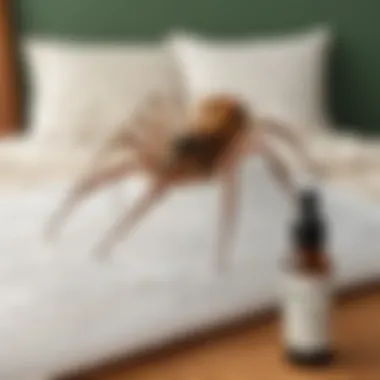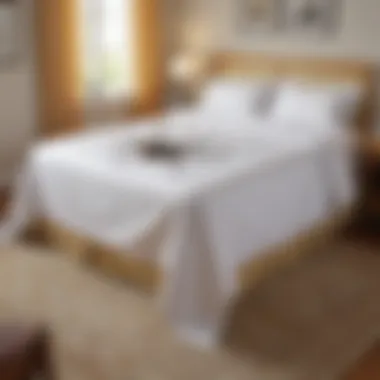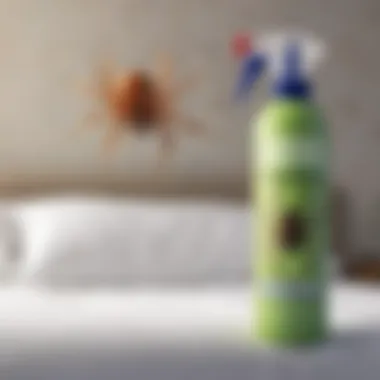Effective Strategies for Keeping Spiders Away from Your Bed


Fun Activities Ideas
To ensure that spiders stay far away from your bed and create a tranquil sleeping space, implementing effective strategies is key. Start by decluttering your bedroom; spiders love secluded spots, so keeping your space tidy will make it less appealing to them. Additionally, consider using essential oils like peppermint, citrus, or lavender, as spiders detest strong scents. These scents not only keep spiders at bay but also promote relaxation for improved sleep quality. Creating a cozy and comfortable sleeping environment is essential for a good night's rest, and these strategies can help you achieve just that.
Understanding Spider Behavior
Common Spider Species Found Indoors
House Spiders
House spiders are a prevalent indoor species known for their adaptability to human habitats. Their small size and ability to hide in crevices and corners make them a challenging species to control. Despite their harmless nature to humans, their presence in living spaces can be unwelcome. Understanding the behavior of house spiders is essential for developing targeted strategies to keep them out of beds.
Jumping Spiders
Jumping spiders are known for their agile movements and distinct hunting techniques. Their keen eyesight and leaping abilities set them apart from other spider species. While their presence indoors may indicate a healthy ecosystem due to their role in controlling insect populations, many individuals prefer to keep these active hunters away from sleeping areas. Exploring the behavior of jumping spiders sheds light on how to discourage them from seeking shelter in beds.
Wolf Spiders
Wolf spiders are robust hunters that do not build webs but actively pursue prey. Their larger size and menacing appearance can instill fear in those encountering them indoors. By understanding the behavior of wolf spiders, individuals can implement strategies to minimize their presence in sleeping environments. This section highlights the unique characteristics of wolf spiders and discusses effective approaches to keeping them at bay.
Why Spiders Are Attracted to Beds


Spiders are attracted to beds for various reasons, with two primary factors being warmth and shelter, and prey availability. Understanding these factors is paramount in devising preventive measures to discourage spiders from making beds their preferred habitat. By exploring the specific aspects of warmth and shelter, and prey availability in relation to spider behavior, individuals can proactively implement strategies to create an unwelcoming environment for spiders in bedrooms.
Warmth and Shelter
Warmth and shelter are key attractants for spiders seeking comfortable resting places. Beds provide an ideal combination of warmth from human body heat and secluded shelter in the form of bedding and tucked-in corners. Understanding why spiders are drawn to the warmth and shelter of beds enables individuals to disrupt these favorable conditions, thereby deterring spiders from settling in sleeping areas.
Prey Availability
Spiders are predator species that rely on hunting for survival. Beds may inadvertently attract spiders due to the presence of other small insects that serve as their prey. By elucidating the role of prey availability in spider behavior, individuals can take proactive steps to reduce insect populations in bedrooms, decreasing the attractiveness of beds as hunting grounds for spiders. This section highlights the importance of addressing prey availability to diminish spider intrusion in sleeping spaces.
Preventive Measures
Preventive measures play a pivotal role in this article, aiming to keep spiders away from your bed. By implementing these strategies, you can safeguard your sleeping environment and ensure a restful night's sleep. The significance of preventive measures lies in their proactive approach to spider control, focusing on deterring spiders before they enter your sleeping space. By incorporating preventive measures, you minimize the risk of spider encounters and the potential disruptions they may cause to your sleep.
Regular Cleaning Routine
Vacuuming
Vacuuming is a key aspect of the regular cleaning routine aimed at eradicating spider habitats and removing potential prey sources. The thorough suction power of a vacuum cleaner can effectively eliminate spider webs, eggs, and debris where spiders may hide. Its ability to reach crevices and corners makes it a popular choice for maintaining a spider-free environment. One unique feature of vacuuming is its non-toxic nature, providing a chemical-free way to keep spiders at bay. Although vacuuming can be time-consuming, its benefits in reducing spider populations outweigh any minor drawbacks.
Decluttering


Decluttering serves as a complementary method to vacuuming, targeting areas where spiders can nest and thrive. Removing unnecessary items and excess clutter reduces hiding spots for spiders and minimizes the risk of infestations. The key characteristic of decluttering lies in creating a less hospitable environment for spiders by eliminating clutter that serves as potential shelter. Its simplicity and cost-effectiveness make decluttering a practical choice for enhancing spider prevention. A unique feature of decluttering is its holistic approach, addressing not only spiders but also general cleanliness and organization. While decluttering may require initial effort, the advantages of a clutter-free space in deterring spiders make it a valuable preventive measure.
Sealing Entry Points
Caulking Cracks
Caulking cracks is an essential step in sealing entry points that spiders may exploit to access your living spaces, including your bed. By filling gaps and cracks with caulking, you block potential entryways for spiders and other pests. The key characteristic of caulking cracks is its ability to create a barrier that restricts spider movement and prevents their entry. The unique feature of caulking lies in its durability and long-lasting seal, providing an effective defense against spider intrusion. While caulking cracks requires precision and attention to detail, its advantages in pest control and energy efficiency make it a worthwhile investment.
Installing Door Sweeps
Installing door sweeps complements caulking by reinforcing the seal around doors, another common entry point for spiders. Door sweeps act as physical barriers that prevent spiders from crawling under doors and gaining access to interior spaces. The key characteristic of door sweeps is their ease of installation and versatility, suitable for various door types and sizes. The unique feature of door sweeps is their dual-purpose function of sealing gaps and improving insulation, contributing to both spider prevention and energy conservation. While installing door sweeps can be a DIY project, their advantages in enhancing home security and comfort make them a recommended choice for keeping spiders out.
Bedding and Furniture Tactics
Bedding and furniture tactics play a crucial role in maintaining a spider-free environment in your bed area. By focusing on specific elements such as bed placement strategies and choosing the right materials, you can effectively deter spiders from making your bed their home. Considering the time we spend sleeping, it's essential to create a habitat that promotes relaxation and peace of mind, free from unwanted arachnid visitors.
Bed Placement Strategies
Avoiding Floor Contact
One key aspect of bed placement strategies is avoiding floor contact. This method involves ensuring that your bed frame or mattress does not touch the floor directly. The primary goal is to eliminate potential hiding spots for spiders, as they often seek dark, secluded areas close to the ground. By keeping your bed elevated, you reduce the likelihood of spiders finding their way onto your bedding, promoting a more hygienic and spider-resistant sleeping environment. Additionally, this practice makes it easier to detect any spider presence and take necessary preventive measures promptly.


Clearing Clutter Underneath
Clearing clutter underneath your bed is another essential strategy to discourage spiders from nesting in your sleeping space. Clutter provides ample hiding places for spiders and other pests, creating favorable conditions for infestation. By decluttering and ensuring the area beneath your bed is clean and organized, you eliminate potential habitats for spiders, making it less inviting for them to settle. This proactive measure not only deters spiders but also contributes to overall hygiene and sleep quality, promoting a healthier environment for rest and relaxation.
Choosing Spider-Repellent Materials
When it comes to selecting bedding materials, opting for spider-repellent options can further enhance your anti-spider strategies.
Silk Sheets
Silk sheets offer a luxurious and functional choice for spider prevention due to their smooth texture and natural repellent properties. Spiders are less likely to cling to silk due to its slippery surface, reducing the risk of them crawling onto your bed. Additionally, silk is hypoallergenic and moisture-wicking, contributing to a comfortable and cozy sleep experience while acting as a natural deterrent to unwanted arachnids.
Cotton Beddings
Cotton beddings are a popular choice for those aiming to keep spiders at bay. Cotton's breathable nature and durability make it a practical and effective option for maintaining a spider-free sleeping environment. Unlike alternative fabrics that may attract or retain pests, cotton's natural properties deter spiders, ensuring a cleaner and more hygienic bedding setting. By incorporating cotton beddings, you not only prioritize comfort and quality but also reinforce your defense against potential spider intrusions.
Professional Assistance
When it comes to effectively dealing with spiders in your sleeping area, seeking professional assistance is a crucial step in ensuring complete eradication of these unwanted pests. Pest control experts possess the knowledge, experience, and tools required to tackle spider infestations efficiently, providing a comprehensive solution to your problem.
Enlisting professional assistance offers various benefits. Firstly, professionals can accurately assess the severity of the infestation and determine the most suitable course of action. Their expertise allows them to identify not only the existing spider species but also potential nesting spots and entry points. This thorough analysis is instrumental in devising a customized treatment plan that specifically targets the root of the issue.
Moreover, professionals use effective and safe methods to eliminate spiders from your bedroom, taking into consideration factors like the presence of children, pets, or individuals with allergies. Their treatments are designed to be both environmentally friendly and potent against spiders, ensuring a long-term solution without causing harm to the inhabitants of your home.
Another essential aspect of professional assistance is the access to ongoing support and follow-up treatments. Pest control experts can provide recommendations on preventive measures to avoid future infestations and offer regular maintenance services to monitor and control spider populations effectively.
Before considering professional assistance, it is vital to recognize the signs that warrant such action. Persistent or recurring infestations despite your best efforts may indicate the need for expert intervention. Additionally, if you encounter spiders that you cannot identify or if you suspect the presence of venomous species, seeking immediate professional help is imperative to safeguard your health and well-being.
By engaging pest control services, you can rest assured that your spider problem will be handled professionally and efficiently, allowing you to relax and enjoy a spider-free environment in your bedroom.



